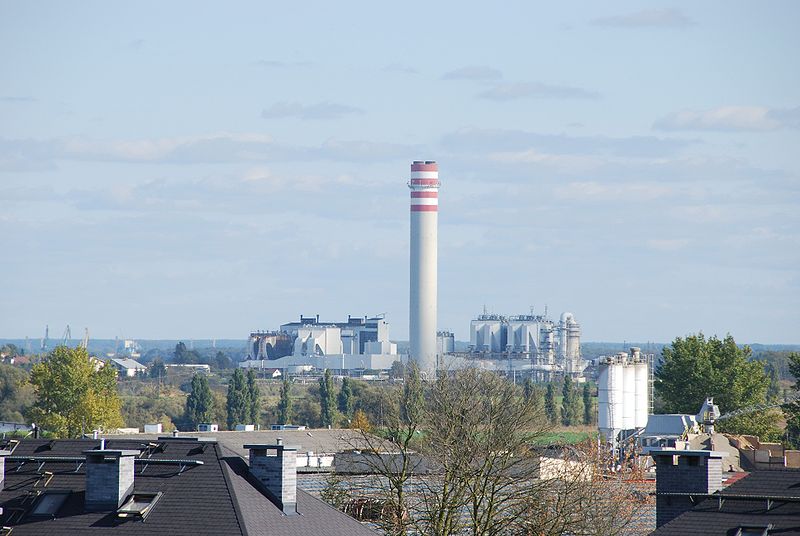Accelerators for Energy and Environment
Accelerators for Energy and Environment
The environmental issues currently facing the world pose a serious challenge to mankind. Diminishing fossil fuel supplies, an increase in carbon emissions and the increasing energy demands of a continuously rising global population are major problems. Accelerators play a vital role in many areas in the energy sector and will play an absolutely vital role in developing new technologies to help protect the environment.
Cleaning Flue Gases from Thermal Power Plants
Small electron accelerators can be used to reduce the amount of harmful gaseous emissions pumped into the atmosphere by thermal power plants. Similar technologies can be applied to water treatment plants to clean waste water.
|
Reducing power plant gas emission: In some pilot plants, electron beams are used to reduce emission of sulphur and nitrogen oxides. Image credit: Pomorzany power plant, Poland - Pkuczynski |
For more information see the Case study: Accelerators for a Sustainable Future.
Oil and Gas Exploration
Oil and gas plays a crucial role in our everyday life for example, it is used to generate the electricity used in our homes or for producing the fuel for our cars. Other everyday products made from oil are computers and phones (plastic parts), hand sanitizer, cosmetics, painkillers and vitamins, detergents. Oil products are even added to our food. As old oil wells are depleted, new wells need to be found along with more effective ways to extract oil and gas. Accelerators play a role in this work.
Looking for oil using neutrons
When searching for new oil deposits, exploratory boreholes are drilled into the ground and the geological structure surrounding the borehole is recorded. One of the techniques used to carry out such investigations is called ‘Neutron Logging’, where by a small portable particle accelerator known as a ‘Portable Neutron Generator’ is lowered into the borehole along with gamma ray detectors. As the neutrons from the accelerator pass through the materials surrounding the borehole they interact with the nuclei in the different materials and high energy gamma rays are emitted. The gamma rays are picked up by the gamma ray detectors and the data is transmitted to a computer. The data is then used to predict the likelihood of finding oil or gas. Portable Neutron Generators are also used in mine and quarry mineral mapping and analysis and in Uranium prospecting.
|
Drilling for Oil: In the search for oil and gas, exploratory boreholes are drilled and a neutron generator and gamma ray detectors are lowered into the borehole for neutron well logging. Image credit: Paul Lowry |
Unclogging oil pipelines
In oil pipelines, substances called asphaltenes can form, causing blockages in the pipes. Until recently, little was known about the formation of these substances. Research carried out at the ISIS neutron source at Rutherford Appleton Laboratory near Oxford has helped researchers increase their understanding of how asphaltenes form inside pipelines, potentially allowing the development of techniques to prevent their formation.
For more information see;
Article [2006] (ISIS): Case Study: ISIS Helps Unclog the Cholesterol of Crude Oil
Increasing the efficiency of oil extraction
Researchers using the ISIS neutron source have developed a new CO2 treatment technique for crude oil extraction. CO2 is used as a solvent for commercial-scale enhanced oil recovery to increase the amount of crude oil that can be extracted from oil fields. This new technique is a more environmentally friendly method of treating CO2 than previous methods, which also increases the efficiency of crude oil extraction.
For more information see;
Article [2010] (ISIS): ISIS Helps Extend the Life of Oil Reserves
Bio-fuel Electron-Beam Pre-treatment
The average cost of diesel is getting higher – for example in the UK the average price has reached £1.40 (€1.71) per litre (in 2012). The average UK household spends £1892.80 (€2319.71) a year on personal transport and an increasingly money conscious and carbon conscious population is showing a growing interest in alternative fuels. One such fuel is biodiesel. Costing around £0.80 (€0.98) per litre in the UK, using biodiesel could save the average UK household £811.20 (€994.48) a year, whilst also reducing their carbon dioxide emission.
Scientists have found that pre-treating bio-fuel with electron beams from a particle accelerator results in a more efficient fuel and reduced amounts of harmful by-products as compared to other methods of bio-fuel pre-treatment.
|
Fuel Farms: Biofuels produce less harmful emissions than oil based fuels and are also cheaper, saving the planet and your money. Electron-Beam Pre-treatment increases the efficiency and further reduces the harmful by-products of bio-fuels. Image credit: hozinja |
For more information see;
Article [2010] (Claremont Climate Report): Irradiating the Future of Biofuel: Using Electron Beam Irradiation Pretreatment to Improve Cellulosic Biofuel Production
Doc [2008] (Plasma Science): Cellulose modification study by e-beam irradiation & its applications
Further Reading
Doc [2010] (Paul Scherrer Institute): Energy and Environment
Book: Reviews of Accelerator Science and Technology, Vol.4 : Accelerator Applications in Industry and the Environment (2010), (ed A. W Chao, W. Chou), World Scientific Publishing Company



